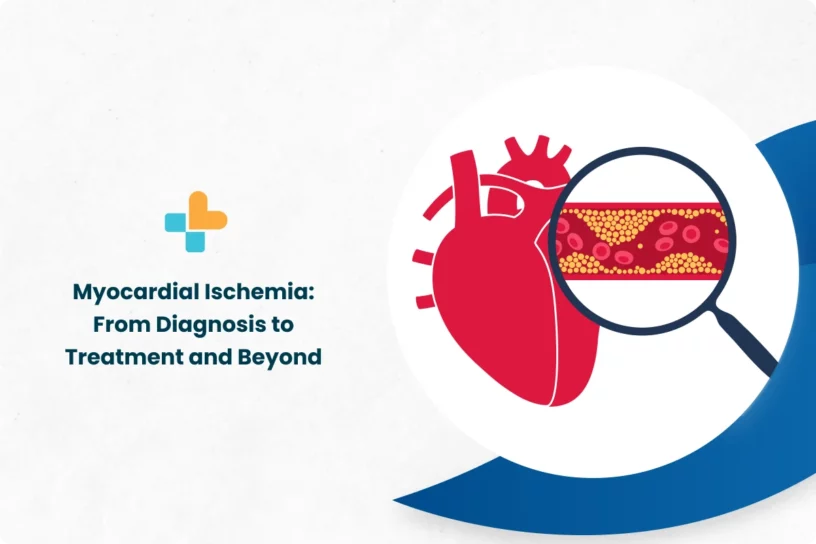What is Myocardial Ischemia?
Myocardial ischemia also known as Cardiac ischemia is a medical condition that occurs when there is a decrease in blood flow to the heart muscle. This can be caused by several factors, including narrowed or blocked coronary arteries, which are the blood vessels that supply blood to the heart muscle. It can lead to damage or death of the heart muscle cells and can ultimately result in a heart attack. It is a severe and potentially life-threatening condition that requires prompt diagnosis and treatment.
Symptoms of Myocardial Ischemia
The symptoms of myocardial ischemia can vary depending on the individual and the severity of the condition. Some common symptoms include:
- Chest pain or discomfort: This is often described as a squeezing, tightness, or pressure in the chest. It may also radiate to the arms, jaw, neck, or back.
- Shortness of breath: This can occur due to decreased oxygen flow to the heart muscle.
- Fatigue: The lack of oxygen to the heart muscle can cause a person to feel tired or weak.
- Irregular heartbeat: Also known as arrhythmia, an irregular heartbeat can occur due to decreased blood flow to the heart muscle.
- Sweating: Some people may experience sweating or cold, clammy skin during an episode of myocardial ischemia.
- Dizziness or light-headedness: This can occur due to decreased blood flow to the brain.
These symptoms can be similar to those of other conditions, so it is important to seek medical attention if you are experiencing them.
What Causes Myocardial Ischemia?
Myocardial ischemia occurs when the heart muscle does not receive enough oxygen-rich blood. There are several causes of myocardial ischemia, including:
- Coronary artery disease: This is the most common cause of myocardial ischemia. Coronary artery disease occurs when the blood vessels that supply the heart muscle with oxygen-rich blood become narrowed or blocked. This can be caused by a build-up of plaque (atherosclerosis) in the blood vessels.
- Spasms of the coronary artery: Sometimes, the coronary artery may spasm, which can decrease blood flow to the heart muscle.
- Blood Clot: A blood clot that forms in a coronary artery can block the flow of oxygen-rich blood to the heart muscle, leading to myocardial ischemia. Blood clots can occur as a result of several different conditions, such as atrial fibrillation, deep vein thrombosis, or a pulmonary embolism. If a blood clot forms in the coronary artery, it can cause a heart attack, which is a serious and potentially life-threatening complication of myocardial ischemia.
Risk factors such as smoking, high blood pressure, high cholesterol, diabetes, and a family history of heart disease can increase the likelihood of developing myocardial ischemia.
Diagnosis and Tests
How is Myocardial Ischemia Diagnosed?
Diagnosis of myocardial ischemia typically begins with a physical examination and a review of the patient’s medical history. The doctor may also order diagnostic tests to confirm the diagnosis. These tests may include an electrocardiogram (ECG), a stress test, or a coronary angiogram.
How is Myocardial Ischemia Treated?
Myocardial Ischemia treatment depends on the underlying cause and severity of the condition. Common treatments include:
- Medications, such as aspirin, nitrates, beta-blockers, calcium channel blockers, and ACE inhibitors.
- Angioplasty and stenting, where a small balloon is inserted and inflated to open up the blocked area.
- Coronary artery bypass surgery, if the above treatments are not effective.
- Lifestyle changes include a healthy diet, exercise, quitting smoking, and stress management.
Complications/Side Effects of the Treatment
Some common side effects of treatment may include bleeding, infection, and an allergic reaction to the medication.
How Long Does It Take to Recover from This Treatment?
The recovery time for myocardial ischemia treatment can vary. In most cases, patients will need to make lifestyle changes and may need to take medication for an extended period.
Tips to Reduce Risk for Myocardial Ischemia
To reduce the risk of myocardial ischemia, it is important to adopt a healthy lifestyle that includes regular exercise, a balanced diet, and stress management. Other tips to reduce risk include quitting smoking, managing high blood pressure and diabetes, and taking medication as prescribed by a doctor.
How Long Does Myocardial Ischemia Last?
The duration of myocardial ischemia can vary depending on the individual and the severity of the condition. In some cases, it may be a temporary condition that resolves with treatment. In other cases, it may be a chronic condition that requires ongoing management.
FAQs
Q: Is myocardial ischemia the same as a heart attack?
Myocardial ischemia is a condition that occurs when the blood flow to the heart is restricted, but it is not the same as a heart attack. A heart attack occurs when the blood flow to the heart is completely blocked, leading to damage to the heart muscle.
Q: Can myocardial ischemia be caused by stress?
Stress can be a contributing factor to myocardial ischemia, as it can increase the risk of heart disease and other health conditions. Finding healthy ways to manage stress, such as through yoga, meditation, or therapy, can help reduce the risk of myocardial ischemia.
Q: What happens if myocardial ischemia is left untreated?
A: If myocardial ischemia is left untreated, it can lead to damage or death of the heart muscle cells and ultimately result in a heart attack. It is important to seek medical attention if you are experiencing symptoms of myocardial ischemia.
Our Hospital Locations
Cardiac Surgery Hospitals in Chandigarh | Cardiac Surgery Hospitals in Bangalore | Cardiac Surgery Hospitals in Jaipur | Cardiac Surgery Hospitals in NCR | Cardiac Surgery Hospitals in Hyderabad
Our Doctors
Cardiac Surgery Doctors in Chandigarh | Cardiac Surgery Doctors in Bangalore | Cardiac Surgery Doctors in Jaipur | Cardiac Surgery Doctors in NCR | Cardiac Surgery Doctors in Hyderabad
About the Author

Dr. Magesh Balakrishnan
Dr. Magesh Balakrishnan is a renowned cardiologist currently practicing at Ayu Health, Bangalore.
He has 16 years of experience in this field. He has excellent skills in performing all cardiac diagnostic procedures/ tests. He has performed emergency and elective angiographies and angioplasties, device implantation (Pacemaker, AICD & CRT)




